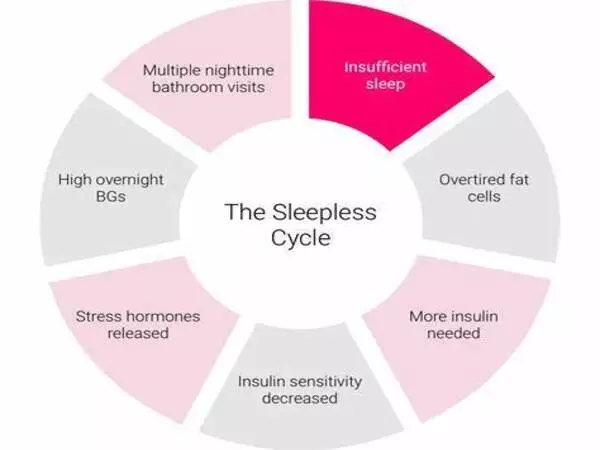Sleep is essential for overall health, and disruptions in the sleep-wake cycle can affect a variety of physiological processes, including metabolism. A new study from Columbia University discovered that cutting sleep by 90 minutes for six weeks increased insulin resistance in women who were used to getting enough sleep. In postmenopausal women, the effect was even stronger.
The recommended amount of sleep for optimal health is between seven and nine hours per night, but roughly one-third of Americans get less than this.
The findings are the first to show that a six-week mild sleep deficit causes changes in the body that increase the risk of developing diabetes in women. Previous studies that demonstrated the negative impact on insulin sensitivity were mostly conducted on men and focused on the effects of very severe sleep restriction over a short period of time.
Childbearing, childrearing, and menopause all cause changes in women’s sleep habits. And more women than men have the perception they aren’t getting enough sleep.
Marie-Pierre St-Onge
Women and sleep
The new study focused on women in particular because previous research has suggested that inadequate sleep has a greater impact on women’s cardiometabolic health than men’s.
“Childbearing, childrearing, and menopause all cause changes in women’s sleep habits,” says study leader Marie-Pierre St-Onge, Ph.D., associate professor of nutritional medicine and director of the Center of Excellence for Sleep and Circadian Research at Columbia University Vagelos College of Physicians and Surgeons. “And more women than men have the perception they aren’t getting enough sleep.”
Studying the health impacts of chronic sleep loss is difficult. Some studies, performed in a laboratory setting, have shown that a brief period of total or partial sleep deprivation impairs glucose metabolism. However such studies do not reflect the typical experience of being mildly sleep-deprived, which means getting by on roughly six hours of sleep for long periods of time.

Study design
To look at the impact of mild, chronic sleep deprivation, the researchers enrolled 38 healthy women, including 11 postmenopausal women, who routinely slept at least seven hours each night.
The participants in the study went through two study phases in a random order. They were asked to maintain adequate sleep in one phase and to delay their bedtime for an hour and a half in the other, reducing their total sleep time to around six hours. These phases each lasted six weeks.
Despite the arduous six-week sleep-restriction phase, all study participants were able to reduce their nightly sleep duration. Wearable devices were used to track adherence to sleep schedules. The researchers measured insulin, glucose, and body fat throughout the study.
Study results
The study found that curtailing sleep by 90 minutes for six weeks increased fasting insulin levels by over 12% overall and by more than 15% among premenopausal women. Insulin resistance increased by nearly 15% overall and by more than 20% among postmenopausal women. Average blood sugar levels remained stable for all participants throughout the study.
“Over a longer period of time, ongoing stress on insulin-producing cells could cause them to fail, eventually leading to type 2 diabetes,” St-Onge said. Although increased abdominal fat is a key driver of insulin resistance, the researchers discovered that sleep deprivation had no effect on insulin resistance.
“The fact that we saw these results independent of any changes in body fat, which is a known risk factor for type 2 diabetes, speaks to the impact of mild sleep reduction on insulin-producing cells and metabolism,” St-Onge said. “The bottom line is that getting adequate sleep each night may lead to better blood sugar control and reduced risk for type 2 diabetes, especially among postmenopausal women.”
Next steps
In recent years, epidemiological studies have suggested that people whose sleep patterns vary from day to day are also more likely to develop diabetes. St-Onge and colleagues will investigate whether improving blood sugar control by stabilizing sleep patterns in people with variable sleep schedules. Additional research will be conducted to determine whether restoring sleep for people who don’t get enough will improve glucose metabolism.














